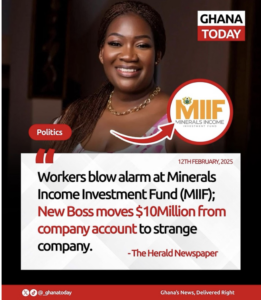The Mahama administration is facing its first major corruption scandal, sparking growing unease within the ruling National Democratic Congress (NDC).
At the center of the controversy is the Mineral Income Investment Fund (MIIF), which is once again embroiled in allegations of financial mismanagement. Even before investigations into irregularities under the previous MIIF leadership—headed by Edward Nana Yaw Koranteng—are concluded, the new leadership is now facing fresh scrutiny over a $10 million gold trading scandal involving BH Mining Limited, a company owned by Yawson Appiah, a well-known financier of the New Patriotic Party (NPP) and a key figure in the NPP’s Gold-for-Oil program.
MIIF’s recent history has been marred by financial mismanagement. Key transactions that raised red flags included; A $94 million payment to Goldridge Refinery Limited, a company owned by Nana Yaw Duodo (Dr. Sledge), with no clear accountability. A $25 million loss incurred by Fidelity Bank Ghana Limited as a result of MIIF’s dealings with Goldridge Refinery.
On Wednesday, February 12, 2025, the Office of the Special Prosecutor (OSP) confirmed that it has launched an investigation into MIIF’s activities.
Despite ongoing scrutiny, MIIF’s new leadership, led by Acting CEO Mrs. Justina Nelson and Deputy CEO Dr. Kwaku Asiedu Nketia Jr., has continued questionable financial dealings. The fund currently has gold trading agreements with five key firms, including Goldridge Refinery (Dr. Sledge), BH Minerals (Yawson Appiah), and three others.
While three firms are reportedly fulfilling their contracts, Dr. Sledge and Yawson Appiah—who control the largest trade volumes—have failed to meet their obligations.
According to reliable sources, MIIF’s new leadership has approved an additional $10 million payment to BH Minerals, despite concerns over its previous transactions.
The transaction in question originates from a gold trade agreement signed under the previous MIIF administration. In early January 2025, just days before President Mahama’s inauguration, BH Minerals received an initial $10 million payment—without delivering any corresponding work.

Upon assuming office, MIIF’s new management was petitioned to investigate the deal and other irregular transactions. However, rather than reviewing the deal or seeking legal advice from the Attorney General, Acting CEO Justina Nelson approved another $10 million payment to BH Minerals—again without any work being done.
This move has sparked public outrage and industry concerns, with many questioning whether the Mahama administration is repeating the mistakes of its predecessors. The lack of due diligence before disbursing a second $10 million payment has fueled speculation that political patronage and vested interests are influencing MIIF’s financial operations.
Yawson Appiah was a key player in Ghana’s Gold-For-Oil and Gold-For-Forex initiatives under the previous NPP administration. Sources indicate that he is now strategically positioning himself to be part of the new GoldBod initiative under the Precious Minerals Marketing Company (PMMC), led by Sammy Gyamfi. This raises concerns about the politicization of Ghana’s gold sector and the continued dominance of politically connected individuals in mineral trade.

The revelation of this dubious $10 million payment has ignited public debate, with growing calls for immediate government intervention. Industry experts, civil society organizations, and anti-corruption advocates are demanding: A full-scale investigation into MIIF’s financial transactions, both past and present, the immediate suspension of politically influenced payments, greater transparency and accountability in MIIF’s operations.

